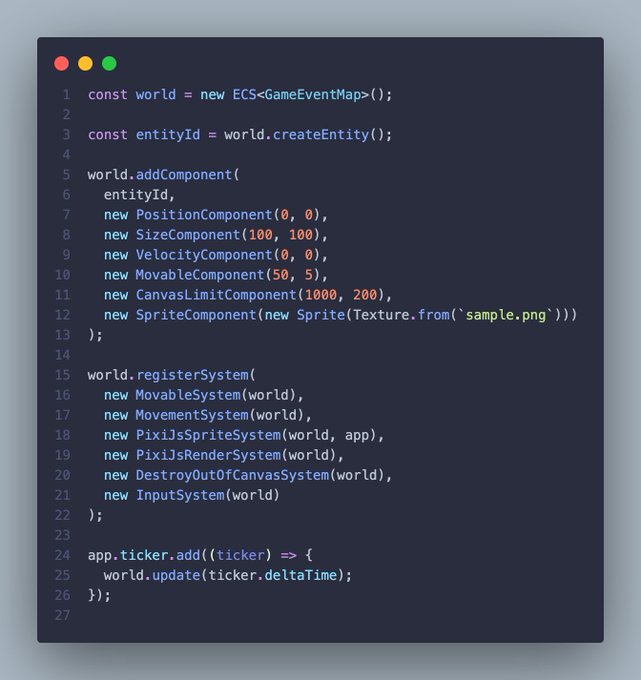I do FP. Close to all I do is FP. And then there is game dev. Is game dev FP friendly? 🤔
I explored how you would go about making a game with FP. It's not working that well.
Let me explain you 👀
Is game dev the ultimate OOP validation?
OOP seems to be the tool for game dev:
I wouldn't say game dev is making me LIKE object oriented programming, but it is making me accept it has a (limited) use case
I made many games in the past, all with OOP (no framework available otherwise):
- Android games with Android Studio and Java 🫠
- Unity games with C# 🏗️
- Godot games with GDScript 🔗
- Flutter games with Dart (
flame) 💙
All were a tangled mess of classes that referenced and mutated other classes.
Even since I joined the FP-side of coding, this classes-thing gives me tingles, as if something is wrong, but works.
I read this referenced as the "Blob anti-pattern" (aka God Objects) 😅
I've never really been convinced about object oriented programming but doing my little game dev hobby has finally shown me one counterpoint that I can get on board with. Makes sense when the domain is literally "objects in a game world" lol.
If you are interested you can read about some of these projects:
FP in games, anyone?
The thing is: there is not much talk about FP in games.
Even imagining an FP architecture in games requires a radical shift, such that it may not be worth it.
I explored some ideas this week, in code. Here is the gist of it:
- Use data instead of objects ("no classes")
- Input is just data as well
- Immutable and scoped updates (no mutations)
export type Vector2D = Readonly<{ x: number; y: number }>;
export type EntityId = number;
export type Component<Label extends string> = Readonly<{
component: Label;
}>;
export type Entity<Label extends string> = Readonly<{
entity: Label;
components: ReadonlyArray<Component<any>>;
}>;
export type GameEntity = PlayerEntity | ObstacleEntity;
export type GameState = Readonly<{
entities: ReadonlyMap<EntityId, GameEntity>;
time: number;
}>;The game state is a function of input and previous state:
export const updateGame = (state: GameState, input: InputState): GameState => {
const updatedEntities = new Map(state.entities);
for (const [entity, component] of state.entities) {
updatedEntities.set(
entity,
Match.value(component).pipe(
Match.when({ entity: "player" }, Player.update),
Match.when({ entity: "obstacle" }, Obstacle.update),
Match.exhaustive
)(input)
);
}
return create(state, (draft) => {
draft.entities = updatedEntities;
draft.time = state.time + 1;
});
};But then things get tricky. How do you create a components' system? How do you implement references between data?
Furthermore, I have been trying to integrate this model with PixiJS, which is a pure mutable OOP-based library. It's hard to translate immutable data to mutable, while taking care of performance.
export const syncPixiState = (
gameState: GameState,
pixiState: PixiState
): void => {
for (const [entity, component] of gameState.entities) {
let sprite = pixiState.sprites.get(entity);
if (!sprite) {
// Create new sprite
sprite = new Sprite(Texture.from(component.texture));
pixiState.stage.addChild(sprite);
pixiState.sprites.set(entity, sprite);
}
entityRenderer(component, sprite);
}
// Remove sprites for entities that no longer exist
for (const [entity, sprite] of pixiState.sprites) {
if (!gameState.entities.has(entity)) {
pixiState.stage.removeChild(sprite);
pixiState.sprites.delete(entity);
}
}
};I didn't come to a definite conclusion (yet), and I am actually exploring other options to keep some sanity even without FP-purism.
Entity Component System (ECS)
And then I came across Entity Component System 🤯
ECS is a pattern for game development that separates components (data), entities ("things" in the world), and systems (logic/implementation).
It's basically composability in game dev 🙌
Traditionally you would think as a "player" object or "enemy" object, and attach all behaviors to them.
In ECS each entity ("player"/"enemy") it's a composition of components ("motion"/"physics"/"input").
A system is then responsible for applying a group of components to entities:
- System A = "motion" + "input" (the input updates the motion)
- System B = "physics" + "motion" (apply physics forces based on motion)
I also learned that Unity provides this system as an alternative to GameObjects (ECS for Unity).
I see a path forward to make this FP-based as well. I plan to explore this more equipped with this new knowledge (pitfalls may apply).
Entity Component System (ECS) brings composability to game development 🪄 Split data and logic, and just compose entities with what they need to operate Clean, composable and powerful 🔥 Show more
Meanwhile, my newest and latest project is out now: Local-only calories tracker app 🚀
New project landing next week Tuesday 26 November 🚀 Local-only calories tracker app 🏗️ @EffectTS_ ⚡️ PGlite with live queries @ElectricSQL 📄 @DrizzleORM 🔗 Actors with XState @statelyai 🧱 @tan_stack router Your next local-first stack 👇 Show more
The world doesn't stop, and React Router v7 and TanStack Start Beta are out as well. No excuses for even more exploration 🫡
See you next 👋


